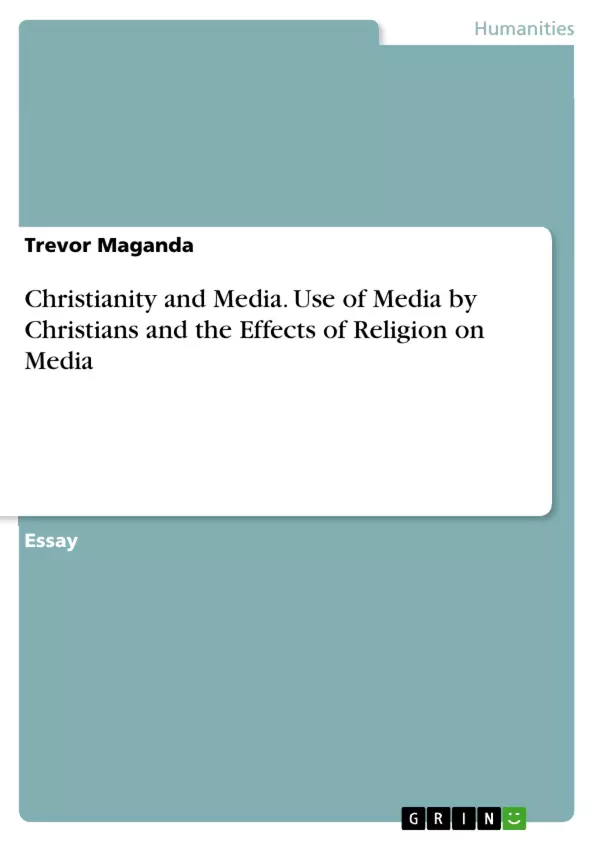The media sector is an integral aspect of the lives of human beings, mainly for individuals in the pursuit of employment, fulfillment of dreams, visions, passion, and entertainment. The media industry is diverse, with complex religious, social, and cultural dynamics that build the foundation on which ideas, projects, and professions are built.
The typical human will devote close to three-quarters of his/her waking lifetime to work. Several Christians do not engage in full-time vocational ministry. It is essential to know how to join our faith into one of the enormous percentages of our lives -work. Since the beginning of time, work has existed. God worked and determined that human beings would work in part of their fellowship with Him. The fall between God and humankind corrupted and broke the perfect fellowship, but it did not fatally destroy God's relationship, work, and worship. God's command to Adam to engage in the world He had created, cultivate it, and fill it with God's glory is a cultural mandate.
The importance of work is not lost on us and is echoed throughout the scriptures. Christians are advised to do all labour in the magnificence of the Lord. It is difficult to excel in the workplace and live solely in the glory of God. Colossians 3:23-24 states, "Whatever you do, work heartily, as for the Lord and not for men, knowing that from the Lord you will receive the inheritance of the reward. You are serving the Lord Christ. "It is important to remember that God is part of our work and exists in our activities as he is at church. Tim Keller, in his book, writes, "Work of all kinds, whether with the hand or the mind, is evidence of our dignity as human beings -because it reflects the image of God, the creator in us."
Inhaltsverzeichnis (Table of Contents)
- Introduction
- Integration of faith at work
- Integration by following the actions of Jesus
- Service on a Biblical foundation
- Roles of Christians in media
- Use of Media by Christians
- Effects of religion on media
Zielsetzung und Themenschwerpunkte (Objectives and Key Themes)
This text explores the intersection of faith and work, particularly within the context of the media industry. It aims to guide Christians on integrating their faith into their professional lives, emphasizing the importance of living out biblical principles in the workplace.
- The role of work in fulfilling God's mandate and reflecting His image
- The impact of faith on professional life, particularly in managing stress and fostering ethical leadership
- The importance of serving others and building relationships in the workplace
- The ethical implications of media work for Christians
- The connection between faith and successful leadership in a business environment
Zusammenfassung der Kapitel (Chapter Summaries)
- Introduction: The chapter establishes the significance of work in Christian life and introduces the concept of integrating faith into professional pursuits. It highlights the importance of work as a reflection of God's image and emphasizes the need to find meaning and purpose in work, aligning it with God's will.
- Integration of faith at work: This chapter delves into the practical aspects of integrating faith into one's career. It emphasizes the importance of trust in God, particularly in overcoming professional challenges and stresses. It highlights the role of biblical principles in guiding ethical business practices and emphasizes the value of serving others and building strong relationships in the workplace.
Schlüsselwörter (Keywords)
The primary focus of this text is on the intersection of Christianity and the workplace, specifically within the media industry. Key themes include faith integration, ethical leadership, biblical principles, service, relationships, and the impact of religious beliefs on media practices.
Frequently Asked Questions
How can Christians integrate their faith into their daily work?
Integration involves following the actions of Jesus, applying biblical principles to ethical decisions, and viewing work as a form of service to God rather than just a means to an end.
What is the "cultural mandate" in Christianity?
The cultural mandate refers to God's command to Adam to engage in the world, cultivate it, and reflect God's glory through creative and productive work.
What roles do Christians play in the media industry?
Christians in media can act as ethical leaders, content creators who reflect biblical values, and professionals who use media platforms to serve the community and share truth.
How does religion affect media content and practices?
Religious beliefs can influence the ethical standards of reporting, the types of stories told, and the overall mission of media organizations toward social responsibility and integrity.
What does the Bible say about working for the Lord?
Colossians 3:23-24 advises believers to work heartily as for the Lord and not for men, emphasizing that their ultimate reward comes from God.
- Citation du texte
- Trevor Maganda (Auteur), Christianity and Media. Use of Media by Christians and the Effects of Religion on Media, Munich, GRIN Verlag, https://www.grin.com/document/1288721



